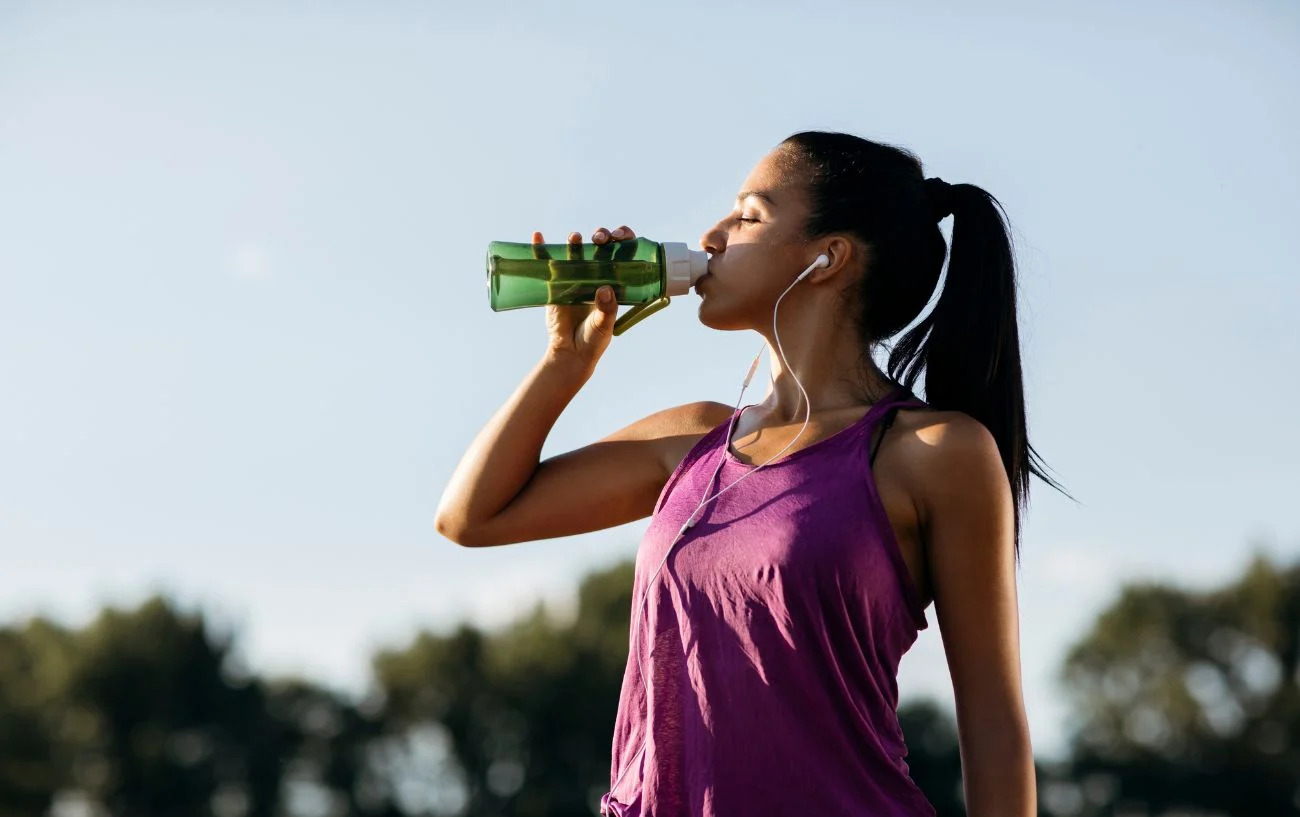

Featured
What To Eat When Training For A Marathon
Modified: January 22, 2024
Looking for the best fuel for marathon training? Discover featured foods to optimize your performance and maximize endurance during your training.
Introduction
Training for a marathon is an incredibly rewarding challenge that requires dedication, discipline, and perseverance. As you prepare your body for the grueling 26.2-mile race, one aspect that should never be overlooked is proper nutrition. The food you eat plays a crucial role in fueling your body, optimizing performance, and aiding in recovery.
Whether you are a seasoned marathon runner or a beginner, understanding the importance of nutrition in your training journey is paramount. With the right balance of macronutrients and micronutrients, you can maximize your energy levels, enhance endurance, and minimize the risk of injuries.
In this article, we will delve into the world of marathon nutrition, exploring the key macronutrients and micronutrients that endurance athletes should focus on. We will also provide valuable insights on hydration, pre-training meal ideas, during-training fueling options, and post-training recovery foods. By the end, you will have a solid foundation of knowledge to fuel your body effectively throughout your marathon training.
Importance of Proper Nutrition in Marathon Training
Proper nutrition is essential for marathon runners to optimize their performance and achieve their goals. Here are a few reasons why nutrition plays a vital role in marathon training:
1. Fueling the body: Marathon running is an intense and demanding sport that requires a significant amount of energy. The food you consume serves as fuel for your muscles, providing the energy necessary to power through long training runs and the race itself. Without adequate nutrition, you may feel fatigued, sluggish, and unable to perform at your best.
2. Enhancing endurance: Endurance is key in marathon running, and proper nutrition can help improve your endurance levels. Consuming a balanced diet that includes the right mix of carbohydrates, proteins, and fats ensures that your body has the necessary fuel to sustain prolonged activity. This, in turn, can help delay the onset of fatigue and improve your overall endurance performance.
3. Supporting muscle repair and recovery: Long-distance running can cause micro-tears in your muscles, which need to be repaired for optimal performance. Adequate protein intake is crucial for muscle repair and recovery. Protein provides the building blocks necessary for repairing damaged muscle fibers, reducing muscle soreness, and promoting faster recovery between training sessions.
4. Boosting immune function: Marathon training can place considerable stress on your immune system, making you more susceptible to illness and infection. Proper nutrition, rich in vitamins and minerals, helps support immune function. A strong immune system is crucial for staying healthy and consistent in your training, reducing the risk of setbacks due to illness.
5. Preventing injury: Running long distances can place significant stress on your joints, tendons, and ligaments. Adequate nutrition, including foods rich in antioxidants and anti-inflammatory properties, can help reduce inflammation and promote joint health. This, combined with a well-balanced diet, can lower the risk of injury and allow for a smoother and more successful marathon training journey.
By paying attention to your nutrition, you can enhance your performance, improve your endurance, speed up recovery, and minimize the risk of injury. Providing your body with the right fuel and nutrients is essential for achieving peak performance and reaching your marathon goals.
Macronutrients for Endurance Athletes
As an endurance athlete training for a marathon, you have specific nutritional needs to support your training and performance. Macronutrients, including carbohydrates, proteins, and fats, form the foundation of your diet and play a crucial role in fueling your body. Here’s a closer look at each macronutrient and its importance:
1. Carbohydrates: Carbohydrates are the primary source of fuel for endurance activities. They provide the glucose needed to power working muscles during training and races. Aim to consume complex carbohydrates such as whole grains, fruits, vegetables, and legumes. These sources provide a steady release of energy and are rich in fiber, vitamins, and minerals. Include carbohydrates in each meal and snack to maintain glycogen stores and prevent fatigue.
2. Protein: Protein is essential for muscle repair, recovery, and growth. During long-distance training, your muscles experience microscopic damage that requires protein to repair. Include lean sources of protein such as poultry, fish, eggs, and legumes in your diet. Aim for about 1.2-2 grams of protein per kilogram of body weight to support muscle repair and maintenance.
3. Fats: Healthy fats are an important energy source during endurance activities. They are also vital for hormone production and nutrient absorption. Include sources of unsaturated fats such as avocados, nuts, seeds, and olive oil in your diet. While fats provide long-lasting energy, be mindful of portion sizes, as they are calorie-dense. Aim for about 20-30% of your daily calories to come from healthy fats.
4. Timing and balance: It’s crucial to distribute your macronutrients throughout the day to optimize energy levels and support recovery. Prioritize carbohydrates around training sessions to fuel workouts and replenish glycogen stores. Aim to consume protein within 30 minutes of completing a training session to initiate muscle repair and recovery. Distribute your fat intake throughout the day to support overall energy needs.
Remember that individual needs may vary, and it’s important to listen to your body. Experiment with different ratios of macronutrients to find what works best for you. Additionally, staying properly hydrated is essential in supporting nutrient absorption and overall performance. Always consult with a registered dietitian or sports nutritionist to tailor your macronutrient intake specifically to your needs.
Carbohydrates
Carbohydrates are the primary fuel source for endurance athletes, including those training for marathons. They provide the energy needed to sustain long training sessions and perform at your best during races. When it comes to carbohydrates, it’s important to focus on quality and quantity. Here’s what you need to know about carbohydrates for marathon training:
1. Complex carbohydrates: Opt for complex carbohydrates, such as whole grains, fruits, vegetables, and legumes. These foods provide a steady release of glucose, which helps maintain stable blood sugar levels and sustained energy during your training sessions. Incorporate whole wheat bread, brown rice, quinoa, sweet potatoes, and berries into your meals and snacks.
2. Glycogen stores: Glycogen is the stored form of glucose in your muscles and liver. It serves as a crucial fuel source during prolonged exercise. To ensure optimal glycogen stores, consume a carbohydrate-rich meal or snack 2-4 hours before your training runs. This will provide your body with the necessary fuel to power through your workouts.
3. Timing: Timing your carbohydrate intake is important, especially around workouts. Prioritize consuming carbohydrates within the hour before your training sessions to top up your glycogen stores. During longer training runs, it’s a good idea to consume easily digestible carbohydrate sources, such as energy gels or sports drinks, to sustain energy levels and delay muscle fatigue.
4. Quantity: The amount of carbohydrates you need will vary depending on your training volume, intensity, and individual needs. Endurance athletes generally require around 5-7 grams of carbohydrates per kilogram of body weight per day. It’s essential to monitor your energy levels and adjust your carbohydrate intake accordingly. If you find yourself feeling fatigued during training, consider increasing your carbohydrate intake by including larger portions of carbohydrates in your meals and snacks.
5. Fiber: While fiber is essential for overall health, it’s important to be mindful of your fiber intake around training sessions. High-fiber foods take longer to digest and may cause gastrointestinal discomfort during exercise. Prioritize fiber-rich foods in your meals earlier in the day, while focusing on easily digestible carbohydrate sources closer to your training sessions.
Carbohydrates are the fuel that powers your marathon training. By choosing quality carbohydrates, timing them appropriately, and monitoring your intake, you can optimize your energy levels, enhance performance, and improve endurance.
Protein
Protein is an essential nutrient for endurance athletes, including those training for marathons. It plays a crucial role in repairing and rebuilding muscles, supporting recovery, and optimizing performance. Here’s what you need to know about protein for marathon training:
1. Muscle repair and recovery: As you train for a marathon, your muscles undergo microscopic damage. Protein provides the building blocks necessary for muscle repair and recovery. It helps to repair damaged muscle fibers, reduce muscle soreness, and promote faster recovery between training sessions. Including adequate protein in your diet is vital for supporting optimal muscle repair and recovery.
2. Recommended intake: The recommended protein intake for endurance athletes is generally around 1.2-2 grams per kilogram of body weight per day. However, individual needs may vary based on factors such as training volume, intensity, and body composition. It’s important to consult with a registered dietitian or sports nutritionist to determine your specific protein needs.
3. Sources of protein: Include a variety of lean protein sources in your diet, such as poultry, fish, eggs, tofu, legumes, and low-fat dairy products. These sources provide high-quality protein with essential amino acids that your body needs for muscle repair and synthesis.
4. Distribute protein intake: Distribute your protein intake evenly throughout the day to support muscle repair and maintenance. Aim to include protein in each meal and snack. Consuming protein within 30 minutes after completing a training session can further enhance muscle recovery and synthesis.
5. Protein supplements: While it’s possible to meet your protein needs through whole foods, protein supplements can be a convenient option for endurance athletes. Whey protein powder, plant-based protein powders, and protein bars can provide a quick and easily digestible source of protein before or after a workout. However, supplements should never replace whole food sources of protein in your diet.
Remember to listen to your body and adjust your protein intake accordingly. If you are constantly fatigued or not experiencing optimal recovery despite adequate training, it may be a sign that you need to increase your protein intake. Pay attention to your individual needs and work with a nutrition professional to optimize your protein consumption for marathon training.
Fats
Fats are an essential macronutrient for endurance athletes training for marathons. While carbohydrates are often the primary source of fuel, fats play a crucial role in providing sustained energy, supporting hormone production, and aiding in nutrient absorption. Here’s what you need to know about fats for marathon training:
1. Healthy fats: Focus on consuming healthy fats, such as monounsaturated and polyunsaturated fats, which are beneficial for heart health and overall well-being. Include foods like avocados, nuts, seeds, olive oil, and fatty fish (like salmon and tuna) in your diet to obtain these healthy fats.
2. Energy source: During longer training sessions and races, your body relies more on fats as a fuel source. By consuming adequate fats, you can provide a sustained energy source for aerobic activities, helping you to conserve glycogen stores and delay fatigue.
3. Overall calorie intake: Fats are calorie-dense, with 9 calories per gram, compared to 4 calories per gram for carbohydrates and protein. While fats are essential, it’s important to be mindful of portion sizes to avoid consuming excessive calories. It’s generally recommended to have around 20-30% of your daily calorie intake come from fats.
4. Omega-3 fatty acids: Omega-3 fatty acids, found in fatty fish, walnuts, and flaxseeds, have anti-inflammatory properties and offer additional benefits for endurance athletes. They can help reduce exercise-induced inflammation and improve recovery. Including omega-3-rich foods in your diet can contribute to overall health and performance.
5. Fat-soluble vitamins: Fats are necessary for the absorption of fat-soluble vitamins, including vitamins A, D, E, and K, which are important for various bodily functions, including immune health and bone strength. By including healthy fats in your diet, you can ensure proper absorption of these essential vitamins.
Balance is key when it comes to fats. Aim to incorporate a moderate amount of healthy fats into your daily meals and snacks. Be sure to prioritize whole food sources of fats rather than relying heavily on processed or fried foods. By including the right balance of healthy fats in your diet, you can support your energy needs, enhance nutrient absorption, and contribute to overall performance and well-being during marathon training.
Micronutrients for Endurance Athletes
While macronutrients (carbohydrates, proteins, and fats) are crucial for fueling your body during marathon training, micronutrients are equally important. Micronutrients include vitamins and minerals, which play essential roles in supporting overall health, performance, and recovery. Here’s a closer look at the micronutrients that endurance athletes should focus on:
1. Vitamins:
- Vitamin C: This vitamin plays a critical role in supporting a healthy immune system and reducing oxidative stress caused by intense exercise. Citrus fruits, bell peppers, strawberries, and leafy greens are excellent sources of vitamin C.
- Vitamin B complex: B vitamins, including B1, B2, B3, B6, and B12, are involved in energy production, red blood cell formation, and neural function. Whole grains, lean meats, dairy products, legumes, and leafy greens are good sources of B vitamins.
- Vitamin D: Adequate vitamin D is vital for bone health, immune function, and muscle strength. While sunlight is the best source of vitamin D, include foods like fatty fish, fortified dairy products, and egg yolks in your diet to ensure sufficient intake.
- Vitamin E: This vitamin possesses antioxidant properties and helps protect cells from oxidative damage. Nuts, seeds, spinach, and avocado are good sources of vitamin E.
2. Minerals:
- Iron: Iron is crucial for carrying oxygen to muscles and maintaining energy levels. Endurance athletes, especially women, are at a higher risk of iron deficiency due to increased iron losses through sweat and foot strike hemolysis. Include iron-rich foods such as lean meats, beans, fortified cereals, and dark leafy greens in your diet.
- Calcium: Calcium is essential for bone health, muscle contraction, and nerve function. Dairy products, fortified plant-based milks, leafy greens, and canned fish with bones are good sources of calcium.
- Magnesium: Magnesium helps with energy production, muscle function, and electrolyte balance. It is found in foods such as nuts, seeds, whole grains, and leafy greens.
- Zinc: Zinc supports immune function, protein synthesis, and wound healing. Good sources of zinc include lean meats, seafood, whole grains, and legumes.
While a well-balanced diet should typically provide sufficient micronutrients, rigorous training and sweating may increase your requirements. Therefore, it is a good idea to focus on consuming a variety of nutrient-dense foods to ensure you’re getting an adequate supply of vitamins and minerals. If you suspect a deficiency, consider consulting with a registered dietitian or healthcare professional who can assess your specific needs and recommend appropriate supplementation if necessary.
Vitamins
Vitamins are essential micronutrients that play a crucial role in supporting overall health, well-being, and performance for endurance athletes. While a balanced diet should generally provide the necessary vitamins, it’s important to be aware of the specific vitamins that benefit athletes. Here’s a closer look at some key vitamins:
1. Vitamin C: Vitamin C is known for its immune-boosting properties and antioxidant effects. It helps protect cells from oxidative stress caused by intense exercise and supports a healthy immune system. Citrus fruits, kiwi, berries, bell peppers, broccoli, and leafy greens are excellent sources of vitamin C.
2. B Vitamins: B vitamins are involved in energy production, red blood cell formation, and neural function. They are particularly important for endurance athletes who need sustained energy. The B complex vitamins include B1 (thiamine), B2 (riboflavin), B3 (niacin), B6 (pyridoxine), and B12 (cobalamin). Whole grains, lean meats, dairy products, legumes, and leafy greens are good sources of B vitamins.
3. Vitamin D: Vitamin D plays a crucial role in calcium absorption, bone health, muscle strength, and immune function. It is synthesized by the body through exposure to sunlight, but food sources can also contribute to vitamin D intake. Fatty fish like salmon and tuna, fortified dairy products, and egg yolks are good sources of vitamin D.
4. Vitamin E: Vitamin E is an antioxidant that helps protect cells from oxidative damage. It also supports immune function and helps with red blood cell formation. Nuts, seeds, spinach, broccoli, and avocado are good sources of vitamin E.
5. Vitamin K: Vitamin K is important for blood clotting, bone health, and plays a role in energy metabolism. Leafy greens, broccoli, Brussels sprouts, and vegetable oils are excellent sources of vitamin K.
Consuming a variety of fruits, vegetables, whole grains, lean proteins, and healthy fats will help ensure that you receive an adequate intake of vitamins. However, it’s important to note that individual vitamin needs may vary based on factors such as training intensity, diet quality, and lifestyle factors.
If you have specific concerns about meeting your vitamin needs, consulting with a registered dietitian or healthcare professional can provide personalized guidance and support. They can assess your dietary patterns, training regimen, and overall health to recommend appropriate food choices or supplementation if necessary.
Minerals
Minerals are essential micronutrients that are vital for various bodily functions, including energy production, immune support, and bone health. As an endurance athlete, it’s important to pay attention to mineral intake to support optimal performance and recovery. Here are some key minerals that benefit athletes:
1. Iron: Iron is crucial for transporting oxygen to muscles and tissues, making it essential for endurance athletes. It plays a vital role in energy production and helps prevent fatigue. Iron-rich foods include lean meats, poultry, seafood, beans, lentils, fortified cereals, and dark leafy greens. It’s important to note that iron absorption is enhanced when consumed with vitamin C-rich foods.
2. Calcium: Calcium is necessary for strong bones, muscle function, and nerve transmission. Endurance athletes, especially female athletes, need to ensure adequate calcium intake. Good sources of calcium include dairy products, fortified plant-based milks, leafy greens, and canned fish with bones.
3. Magnesium: Magnesium is involved in over 300 enzymatic reactions in the body, including energy production, muscle function, and electrolyte balance. It is found in nuts, seeds, whole grains, legumes, and leafy greens. Ensuring sufficient magnesium intake can help support muscle function and prevent cramping.
4. Zinc: Zinc plays a vital role in immune function, protein synthesis, and wound healing. It is involved in numerous metabolic processes that support overall health and performance. Good sources of zinc include lean meats, seafood, whole grains, legumes, and seeds.
5. Sodium and Potassium: These electrolytes are important for maintaining fluid balance, nerve function, and muscle contractions. During prolonged endurance activities, sodium is lost through sweat and needs to be replenished. Good sources of sodium include sports drinks and salty snacks. Potassium, found in bananas, oranges, potatoes, and leafy greens, helps regulate heart and muscle function.
While a well-balanced diet should provide sufficient minerals, intense training and sweating may increase your needs. It’s important to monitor your mineral intake, especially if you follow dietary restrictions or have specific health concerns. Consulting with a registered dietitian or healthcare professional can help assess your needs and provide guidance on maintaining proper mineral balance.
Remember to evaluate your diet and, if necessary, consider supplementation under the guidance of a healthcare professional to support your mineral requirements as an endurance athlete.
Hydration for Marathon Training
Proper hydration is crucial for marathon training as it directly affects your performance, endurance, and overall well-being. When you sweat during training, you lose water and electrolytes, which must be replenished to maintain optimal hydration levels. Here are some essential guidelines for staying hydrated during marathon training:
1. Pre-training hydration: Start your training runs well-hydrated by drinking water or a sports drink 1-2 hours before your workout. This helps ensure that you begin your run adequately hydrated, which is especially important for longer training sessions.
2. During-training hydration: During long training runs, aim to consume fluids regularly to replace the fluids lost through sweat. The American College of Sports Medicine recommends drinking 5-12 ounces of fluids every 15-20 minutes, depending on your sweat rate and the weather conditions. Water is a good choice for shorter runs, while electrolyte-rich sports drinks can help replenish electrolytes for longer runs lasting over 90 minutes.
3. Electrolytes: Along with fluids, it’s important to replenish electrolytes that are lost through sweat, particularly sodium and potassium. Sports drinks or electrolyte supplements can help maintain the electrolyte balance necessary for proper muscle function and hydration.
4. Post-training hydration: After your training runs, replenish any fluid deficits by consuming fluids within 30 minutes of completing your workout. Water is usually sufficient for rehydration, but a sports drink may be beneficial if the workout was particularly intense or if sweating was excessive.
5. Monitoring hydration status: Monitoring your hydration status is essential. Pay attention to the color of your urine, aiming for light-yellow or pale-yellow urine, which indicates proper hydration. Dark urine may indicate dehydration and the need for increased fluid intake.
6. Individualized hydration needs: Keep in mind that individual hydration needs vary depending on factors such as body weight, climate, intensity of training, and sweat rate. Experiment during training runs to find the right amount and combination of fluids that work best for you.
Remember, dehydration can negatively impact performance, increase the risk of cramping, and lead to heat-related illnesses. Hydration should be a priority not only during training runs but also throughout the day. Aim to drink water regularly and include hydrating foods such as fruits and vegetables in your diet.
By understanding the importance of hydration and implementing strategies to maintain optimal fluid balance, you can support your marathon training efforts and ensure peak performance on race day.
Pre-Training Meal Ideas
The food you eat before a training run plays a crucial role in providing the energy and nutrients necessary to fuel your performance. A well-balanced pre-training meal should include a combination of carbohydrates, protein, and healthy fats. Here are some pre-training meal ideas to help you optimize your marathon training:
1. Overnight oats: Prepare a bowl of overnight oats by soaking oats in your choice of milk or yogurt overnight. In the morning, top it with fruits, nuts, and seeds for added flavor, texture, and nutritional value. Overnight oats provide a blend of complex carbohydrates, protein, and healthy fats to sustain your energy levels during the training run.
2. Whole grain toast with nut butter and banana: Spread your favorite nut butter, such as almond or peanut butter, on whole grain toast. Top it off with slices of banana for an additional source of carbohydrates and potassium. This quick and easy option provides a good balance of carbohydrates, protein, and healthy fats.
3. Greek yogurt with berries and granola: Enjoy a serving of Greek yogurt mixed with fresh berries and a sprinkle of granola. Greek yogurt is high in protein, which aids in muscle repair and recovery. The berries add antioxidants and carbohydrates, while the granola provides some healthy fats and extra crunch.
4. Veggie omelette: Whip up a vegetable-packed omelette using egg whites or whole eggs. Fill it with your choice of vegetables like spinach, peppers, mushrooms, and onions for added nutrients and fiber. This protein-rich meal option helps support muscle repair and provides essential vitamins and minerals.
5. Quinoa salad with lean protein: Create a quinoa salad by mixing cooked quinoa with a variety of colorful vegetables such as bell peppers, cucumbers, tomatoes, and diced chicken or tofu for a vegetarian option. Quinoa is a nutrient-dense grain that provides complex carbohydrates and protein, making it an excellent choice for sustained energy.
6. Smoothie with protein powder: Blend together a smoothie using your choice of fruits, leafy greens, a scoop of protein powder, and a liquid base like almond milk or coconut water. Smoothies offer a convenient way to consume a blend of carbohydrates, protein, and hydration before your training run.
Remember to give yourself enough time to digest your pre-training meal before your run. Aim to eat around 1-2 hours before your workout to allow for proper digestion. Experiment with different meal options to find what works best for your stomach, energy levels, and performance during training.
Lastly, listen to your body and adjust portion sizes based on your individual needs. With the right pre-training meal, you can fuel your body effectively and perform at your best during your marathon training runs.
During-Training Fueling Options
During long training runs, it’s crucial to provide your body with the necessary fuel and hydration to maintain performance, delay fatigue, and prevent muscle depletion. Here are some effective fueling options to consider for your marathon training:
1. Energy gels: Energy gels are convenient and easily digestible fuel sources that typically come in single-serving packages. They contain a concentrated form of carbohydrates, providing a quick source of energy. Take an energy gel every 30-45 minutes during your long runs to replenish glycogen stores and maintain energy levels.
2. Sports drinks: Sports drinks provide a combination of carbohydrates and electrolytes, making them an effective option for both hydration and fueling. They help replenish electrolytes lost through sweat and provide carbohydrates for sustained energy. Consume sports drinks during longer training runs, especially in hot and humid conditions.
3. Bites and chews: Energy bites or chews are small, portable snacks that provide a mix of carbohydrates, often in the form of chewy gummies or bites. These snacks are easy to carry and can be consumed on the go. They provide a quick and convenient source of energy during long runs.
4. Homemade snacks: If you prefer more natural and homemade options, consider making your own fueling snacks. Examples include homemade energy bars made with oats, nuts, dried fruits, and honey or homemade trail mix with a mix of nuts, seeds, and dried fruits. These snacks offer a combination of carbohydrates, protein, and healthy fats for sustained energy.
5. Hydration with water and electrolytes: Staying properly hydrated during your training runs is crucial. Alongside fueling snacks, ensure you have a hydration plan in place. Drink water regularly to maintain hydration levels, and consider alternating with electrolyte-rich beverages or tablets to replenish sodium and other minerals lost through sweat.
Experiment with different fueling options during your training runs to find what works best for you. It’s important to find a balance between fueling regularly without consuming excessive amounts that may cause gastrointestinal distress. Practice fueling during your long runs to determine the timing and quantity that suits your needs.
Lastly, make sure to test any fueling options during your training runs prior to race day. This will help you assess their effectiveness, taste, and impact on your performance. By fueling effectively and maintaining proper hydration during your training runs, you can optimize your performance and prepare your body for the demands of the marathon race.
Post-Training Recovery Foods
Post-training nutrition is essential for replenishing glycogen stores, repairing muscle tissue, and promoting recovery after intense training sessions. Consuming the right foods following your workouts can enhance your body’s ability to recover and adapt to the physical stress. Here are some post-training recovery foods to consider for your marathon training:
1. Protein-rich foods: Protein is crucial for muscle repair and recovery. Consuming a protein-rich snack or meal within 30 minutes to an hour after your training session can help kick-start the recovery process. Opt for lean sources of protein such as lean meats, poultry, fish, eggs, Greek yogurt, or plant-based options like tofu, tempeh, and legumes.
2. Complex carbohydrates: After a training session, replenishing glycogen stores is important for muscle recovery. Include complex carbohydrates in your post-training meal to provide your body with the energy it needs to restore glycogen levels. Whole grains, potatoes, quinoa, and fruits are good sources of complex carbohydrates.
3. Antioxidant-rich foods: Intense exercise generates oxidative stress and inflammation in the body. Consuming foods rich in antioxidants can help counteract this effect and support recovery. Include colorful fruits and vegetables like berries, leafy greens, citrus fruits, and bell peppers in your post-training meal to boost your antioxidant intake.
4. Healthy fats: Including a source of healthy fats in your post-training meal can help reduce inflammation and promote satiety. Foods like avocados, nuts, seeds, and olive oil are excellent sources of healthy fats. Consider adding a small amount to your meal or snack to provide extra nourishment and flavor.
5. Hydration: Rehydrating after your training session is crucial. Aim to drink fluids containing water and electrolytes to replace those lost through sweat. Water, coconut water, or a sports drink can be suitable options to replenish fluids and electrolytes quickly.
6. Smoothies or protein shakes: A post-training smoothie or protein shake can be a convenient and efficient way to replenish your body with essential nutrients. Blend together a mix of fruits, protein powder, yogurt or milk, and a small handful of nuts or seeds to create a nutrient-packed recovery drink.
Remember, the timing of your post-training meal is crucial. Aim to have your meal or snack within the first hour after your workout to maximize the benefits of recovery. This window of time is when your body is most receptive to nutrient absorption and muscle repair.
By focusing on nutrient-dense foods that provide a blend of protein, carbohydrates, and healthy fats, you can support your recovery, minimize muscle soreness, and prepare your body for the next training session.
Sample Meal Plan for Marathon Training
Having a well-balanced and nutrient-dense meal plan is crucial for marathon training. Here’s a sample meal plan to help you fuel your body effectively throughout your training:
Breakfast:
- Option 1: Overnight oats with Greek yogurt, topped with mixed berries, and a sprinkle of almonds or chia seeds.
- Option 2: Whole grain toast topped with mashed avocado, a poached egg, and a side of fresh fruit.
Snack:
- Option 1: Apple slices with peanut butter.
- Option 2: Greek yogurt with a handful of mixed nuts and a drizzle of honey.
Lunch:
- Option 1: Quinoa salad with mixed vegetables (such as bell peppers, cucumber, and cherry tomatoes), grilled chicken or tofu, and a lemon vinaigrette dressing.
- Option 2: Whole grain wrap with lean turkey or hummus, mixed greens, sliced avocado, and a side of carrot sticks.
Pre-Training Snack:
- Option 1: Banana with a tablespoon of almond butter.
- Option 2: Low-fat Greek yogurt with a small handful of granola or a homemade energy bite.
During Training:
- Option 1: Energy gel or sports drink every 30-45 minutes for longer runs.
- Option 2: Electrolyte-rich sports drink mixed with water for hydration during training.
Post-Training Recovery Meal:
- Option 1: Grilled salmon or tofu with a side of quinoa or sweet potatoes and steamed vegetables.
- Option 2: Whole grain pasta with lean ground turkey or lentils, marinara sauce, and a side salad.
Evening Snack:
- Option 1: Greek yogurt with a drizzle of honey and a sprinkle of nuts or seeds.
- Option 2: Cottage cheese with fresh fruit and a small handful of whole grain crackers.
Remember to stay hydrated throughout the day by drinking water regularly. Additionally, adjust portion sizes and overall calorie intake based on your individual needs and training volume. If you have specific dietary requirements or restrictions, consult with a registered dietitian who can help tailor a meal plan to suit your needs.
This sample meal plan is intended to provide general guidance. Feel free to modify and personalize it based on your preferences and specific nutritional needs. Consistency and balance in your nutrition, coupled with your training, will help you optimize your performance and reach your marathon goals.
Conclusion
Proper nutrition is a key component of successful marathon training. Fueling your body with the right balance of macronutrients and micronutrients is essential for optimal performance, endurance, and recovery. By prioritizing nutrition, you can improve your energy levels, enhance your overall performance, and reduce the risk of injury and illness.
Focus on incorporating complex carbohydrates, lean proteins, and healthy fats into your diet. Complex carbohydrates provide sustained energy, proteins support muscle repair and recovery, and healthy fats help with inflammation reduction and absorption of fat-soluble vitamins.
Additionally, pay attention to your micronutrient intake by consuming a variety of fruits, vegetables, and whole foods. Vitamins and minerals play important roles in supporting immune function, bone health, and overall well-being.
Hydration is another critical aspect of marathon training. Maintain proper hydration by regularly drinking water, electrolyte-rich beverages, and fluids before, during, and after your training sessions.
Lastly, a well-thought-out meal plan can enhance your training journey. Focus on consuming balanced meals and snacks that provide a blend of nutrients to fuel your workouts, support recovery, and optimize performance.
Remember, everyone’s nutritional needs may vary, so it’s essential to listen to your body. Experiment with different foods, hydration strategies, and fueling options to find what works best for you.
By prioritizing proper nutrition and hydration in your marathon training, you are setting yourself up for success in achieving your goals and crossing that finish line strong and proud.









